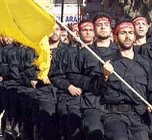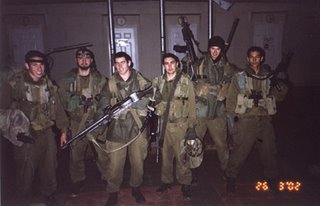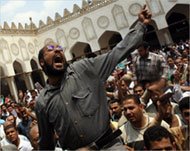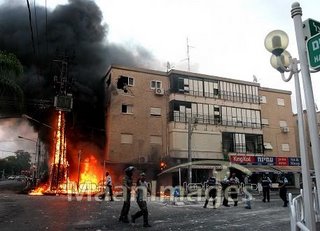Bush Blames Militants for Middle East Bloodshed Video
Remarks by President Bush and German Chancellor Merkel In Press Availability
________________
Bush, Merkel call for restraint in Mideast
By TOM RAUM, Associated Press Writer
STRALSUND, Germany - President Bush said Thursday that Israel has the right to defend itself as it launched fresh attacks on Lebanon after the capture of Israeli soldiers.
Bush, visiting German Chancellor Angela Merkel en route later in the week to a summit of world leaders in Russia, laid the blame for the escalation of violence along the border on Hezbollah, whose guerrillas mounted a cross-border raid earlier in the week and captured the two soldiers.
He also said that Syria "needs to be held to account" for supporting and harboring Hezbollah.
"The soldiers need to be returned," the president said. "It's really sad where people are willing to take innocent life in order to stop that progress (for peace). As a matter of fact, it's pathetic."
The violence comes at a delicate time in the Middle East — and for the United States and its European allies, which are trying to preserve a coalition to confront Iran over suspected nuclear ambitions.
Merkel appealed for restraint from both sides. But she suggested they do not share equal blame, repeatedly noting that the violence began with the soldiers' capture.
"I think that one needs to be careful to make a distinction between the root causes and the consequences of something," she said.
In response to Wednesday's capture, Israel bombed Beirut's airport and the southern part of the country in its heaviest air campaign against its neighbor in 24 years. Israel also imposed an air and naval blockade on Lebanon to cut off supply routes to militants.
Bush was pressed on whether Israel's military assaults, which have killed nearly three dozen civilians, could trigger a wider war. He tempered his strong support for Israel by saying his "biggest concern" was that the attacks could weaken the Lebanese government led by Prime Minister Fuad Saniora and make it harder for the fledgling democracy movement there to continue to grow.
"Whatever Israel does, though, it should not weaken the Saniora government in Lebanon," he said. "We're concerned about the fragile democracy in Lebanon."
"Having said that, people need to protect themselves," he added, referring to Israel.
On Iran, both Bush and Merkel declined to take a hard line against Tehran, which has defied appeals from the United States, Germany and other nations to provide an answer by Wednesday on whether it would accept a package of incentives to halt uranium enrichment. The United States and other permanent members of the U.N. Security Council, along with Germany and the European Union, have agreed to raise Iran's behavior at the Security Council for possible punishment.
"I truly think they are trying to wait us out," Bush said. "And I think they are going to be sorely mistaken. I think they are going to be disappointed, that this coalition is a lot stronger than they think."
Said Merkel: "Should Iran not in any way reply to this offer and accept this offer, we unfortunately have to embark on a new course."
She added, "The door has not been closed."
Downplaying tensions between U.S. and Russia — where Bush is headed on Friday — the president laughed off a snide comment directed at Vice President Dick Cheney by Russian President Vladimir Putin.
In the former Soviet republic of Lithuania in May, Cheney had accused the Kremlin under Putin of backsliding from democracy and bullying Russia's neighbors on energy.
"I think the statements of your vice president of this sort are the same as an unsuccessful hunting shot," Putin said in an interview with NBC broadcast on Wednesday. The remark referred to Cheney's shotgun blast on a hunting trip that accidentally wounded a companion.
"It was pretty clever," said Bush, who meets with Putin ahead of the Group of Eight meetings.
"It was quite humorous — not to diss my friend the vice president."
Both Merkel and Bush said they would like to see democratic reforms in Russia and would press that point in private. Bush also suggested Putin needs additional convincing from both leaders to remain with them in sending a clear message to Iran. But the leaders agreed they are reluctant to criticize Putin too harshly in public.
"Nobody really likes to be lectured a lot," Bush said.
With Merkel, Bush was celebrating a new era of relatively tension-free U.S.-German relations. The controversy between the two countries over American detentions at the Guantanamo Bay prison in Cuba didn't even come up in their joint availability — either in remarks by the leaders or questions from reporters.
And the subject of the war in Iraq, which so divided Bush and Merkel's predecessor, former Chancellor Gerhard Schroeder, was barely mentioned.
While Bush was in Germany, however, the White House did announce that Iraqi Prime Minister Nouri al-Maliki would be visiting Washington later this month to meet with the president. The two first met on June 13, when Bush made a surprise trip to Baghdad.
"I bring a message from the American people: we're honored to call the German people friends and allies," Bush told a crowd of several hundred gathered for his arrival in this northern port city's old market square.
Merkel welcomed Bush to her home district in the formerly communist Eastern Bloc region with a gift of a small barrel of pickled herring, a local delicacy. The president laughed, both surprised and pleased.
A military band played marches in the cobblestoned city center — towered by St. Nicholas Church and a town hall dating to medieval times — where most of the president's events for the day took place. The leaders' serious meetings were followed by lunch and a tour of the 700-year-old church.
In the evening, Bush's visit to Merkel's old neighborhood was wrapping up with a wild boar barbecue in the small town of Trinwillershagen.
Though anti-Bush protesters gathered, thousands of police were keeping most far from the areas Bush was to tour.
But before the president's arrival from an overnight in a resort town on the Baltic Sea, a representative from the environmental group Greenpeace struggled to display a yellow "No War, No Nukes, No Bush" banner from the church's clock tower.
Reflecting the widespread dislike of the Iraq war in Germany, eight rainbow peace banners also hung from the trade union building on the square, directly across from Bush's podium.
 Syrian Ambassador to the UN Bashar Ja'afari speaks about the conflict between Israel and Lebanon after a meeting of the United Nations Security Council in New York July 14, 2006. Syria will put its resources at the disposal of Lebanon to help cope with Israeli attacks devastating the country, Syrian President Bashar al-Assad told Lebanese President Emile Lahoud by phone on Saturday. (Chip East/Reuters)
Syrian Ambassador to the UN Bashar Ja'afari speaks about the conflict between Israel and Lebanon after a meeting of the United Nations Security Council in New York July 14, 2006. Syria will put its resources at the disposal of Lebanon to help cope with Israeli attacks devastating the country, Syrian President Bashar al-Assad told Lebanese President Emile Lahoud by phone on Saturday. (Chip East/Reuters) 









































